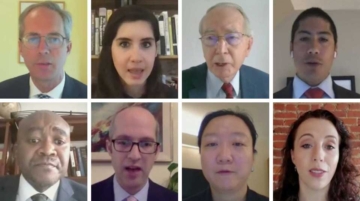
By Lukas Fiala
A little over a month ago, we argued the upcoming Trump presidency may well present an opportunity for Beijing to push ahead with its quest to transform global order to benefit Chinese interests. With Trump 2.0 fast approaching and the Gregorian calendar set on 2025, it’s good to take a step back and identify priorities in the year ahead. There are three macros I’ll be watching especially carefully over the coming year:
First, the secondary effects of Trump’s return to the White House later this month. While much has been said regarding the potential consequences of the recent U.S. elections for U.S.-China relations, the second-order effects such as the role of middle powers across the Global South and North have received less attention.
Will an economically isolationist U.S. spur on European powers to step up and engage more pro-actively across development and trade policy? How will regional players such as Turkey in the Middle East or Indonesia in Southeast Asia balance a more erratic U.S. foreign policy establishment with their interests in maintaining beneficial relationships with Beijing and Washington? Answers are currently hard to come by, but it should be clear that Trump’s comeback will reverberate far beyond the bilateral U.S.-China relationship.
The second issue I will be keeping a close eye on is the “new normal” in China’s foreign economic policy of exporting advanced technology. While underway for several years, China’s rapid transformation to become a leading electric vehicle producer has thrust this issue into the minds of policy makers globally. Across the Global South, some of China’s key partners have responded to Chinese export-oriented trade policy with trade restrictions.
From Brazil to Turkey, it will be interesting to see how Chinese firms are responding to these new constraints – will they acquiesce to regulatory demands and localise production to escape punitive trade restrictions and if so, which countries will be most adept at extracting concessions that may facilitate valuable tech transfers?
Though China’s dominance in green tech and renewables is the consequence of over a decade of industrial policy and planning, it is now that we are beginning to see the longer-term foreign policy consequences of Xi Jinping’s expansive industrial policy agenda and its effects on China’s image as a developing partner of the Global South.
Finally, I will be following the implementation of China’s more pro-active security agenda, now spearheaded by the Global Security Initiative (GSI). Echoing Xi’s speech at China’s Central Conference on Work Relating to Foreign Affairs in December 2023, the GSI represents Beijing’s attempt at innovating its outward-facing security policy while shaping international events in the context of a more challenging foreign policy environment.
When the GSI was first promoted two years ago, I was sceptical of the initiative’s efficacy. And while I still have doubts as to its genuine impact on specific security issues, it has admittedly been very interesting to see how Beijing has begun to implement the new initiative across the Global South.
From Africa’s designation as a GSI “demonstration zone” at FOCAC last September to China’s continuous engagement in crisis diplomacy in the Horn of Africa, the continent will continue to be a key focal point to assess China’s global security agenda. China’s recent rapprochement with India and a more assertive approach to insecurity in Pakistan may also become folded into the wider GSI narrative.
While daily headlines will redirect our focus to many issues beyond these three, how China fares across the above will be a bellwether for the success of its wider international strategy in 2025 and beyond.
Lukas Fiala is the project head of China Foresight at LSEIDEAS.








